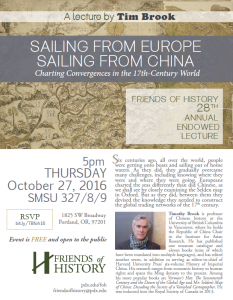Events
CAPS Presents: New Political Realities in East Asia Workshop
 Friday, August 25, 2017 from 9:30 am – 5:00 pm
Friday, August 25, 2017 from 9:30 am – 5:00 pm
White Stag Block, UO Portland, Room 346
Information can be found here.
This one-day workshop is aimed at faculty who are interested in developing curriculum that incorporates aspects of contemporary politics in East Asia into their courses. The workshop provides a broad, interdisciplinary introduction to the current political situations in China, Japan, and Korea. Speakers will provide approachable topics with examples, and the workshop schedule allows ample time for questions and discussion.
This event is sponsored by the Center for Asian and Pacific Studies (CAPS) and the National Resource Center for East Asian Studies.
New Political Realities in East Asia
Presented by the UO Center for Asian and Pacific Studies (CAPS) and Title VI National Resource Center for East Asian Studies (NRC)
Schedule for the Day:
9:30 am: Opening remarks by Jeffrey Hanes, Director CAPS and NRC; Associate Professor, History, University of Oregon
9:45 am: Participant introductions
10:00 am: Mel Gurtov, Professor Emeritus, Political Science, Portland State University. “East Asia Hot Spots: North Korea and the South China Sea.”
This talk will examine the North Korea nuclear issue and the South China Sea dispute from the perspective of all the major players, particularly the US, China, and the two Koreas, and Japan. Equal attention will be given to the background and evolution of the issue, and to possible paths to conflict management.
11:30 am: Martin Hart-Landsberg, Professor Emeritus, Economics, Lewis and Clark College. “Causes and Consequences of Globalization: East Asia and the U.S.”
This talk will explore the forces that shaped contemporary globalization dynamics and the resulting new international division of labor, with special emphasis on East Asia and the United States. It will highlight the ways in which the economic contradictions and imbalances generated by the globalization process led to the “Great Recession” and the current weak global recovery. It will also discuss the implications of the sustained slowdown in international economic trade and growth for working people in East Asia and the United States.
12:50 pm: Lunch
2:00 pm: Tuong Vu, Director, Asian Studies Program; Professor, Political Science, University of Oregon. “East Asia’s New Nationalism: Causes and Consequences for Peace and Development.”
This talk will discuss the rise of a new nationalism following the end of the Cold War in Korea, China, Taiwan, Vietnam, Thailand, the Philippines, Indonesia, and Cambodia. It will focus on the causes of this region-wide phenomenon and its consequences for peace and development in the region.
3:30 pm: Lee Rumbarger, Director, Teaching Engagement Program, University of Oregon. “Designing Student Learning Experiences.”
In this interactive session, we’ll consider how to incorporate this year’s workshop theme into future and existing courses. What are your goals for student learning? How can you create compelling entry points, assessments, and occasions to deepen student reflection and learning? We’ll sketch a module or unit and brainstorm ways to make what you’re discussing as faculty experts come alive for your students in the classroom.
4:50 pm: Closing Remarks by Jeffrey Hanes, Director CAPS and NRC; Associate Professor, History, University of Oregon
Buddhism and East Asian Culture: Practice in Context

Buddhism and East Asian Culture:
Practice in Context
Dr. Mark Unno, Associate Professor of Japanese Buddhism,
Religious Studies, University of Oregon
Thursday, April 27, 2017 at 6:30 PM
PSU Smith Memorial Student Union, Room 238
1825 SW Broadway, Portland
FREE & Open to the public.
DESCRIPTION:
There is a stereotype in the West of Buddhism: the solitary mediator sitting on a cushion, peaceful, a seeker of enlightenment. Yet, only a small percentage of Buddhists in Asia actually practice seated meditation. Instead, Buddhism in Asia is more often been woven into the fabric of culture through a wide range of practices, rituals, art, and institutions. In this presentation, Dr. Mark Unno, Associate Professor of East Asian Buddhism in the Department of Religious Studies at the University of Oregon, will discuss selected strands of East Asian Buddhist practice and culture, with a particular emphasis on Zen, Pure Land, and the fine arts, such as Buddhist iconography and the Tea Ceremony. The practices of these disciplines will be examined in cultural context with comparative observations involving Western religion and culture.
 About the speaker: Mark Unno is Associate Professor of Japanese Buddhism, and served as Head of the Department of Religious Studies at the University of Oregon (2011-14). He received his Ph.D. from Stanford University, and his research is in Classical Japanese Buddhism, in particular Zen, Shin Buddhism, and Shingon Buddhism. He also works in the areas of comparative religion, Buddhism and psychotherapy, and interrreligious dialogue. He is the author of Shingon Refractions: Myoe and the Mantra of Light (2004), editor of Buddhism and Psychotherapy Across Cultures (2006) as well as articles in Buddhist journals such as Tricycle and Buddhadharma.
About the speaker: Mark Unno is Associate Professor of Japanese Buddhism, and served as Head of the Department of Religious Studies at the University of Oregon (2011-14). He received his Ph.D. from Stanford University, and his research is in Classical Japanese Buddhism, in particular Zen, Shin Buddhism, and Shingon Buddhism. He also works in the areas of comparative religion, Buddhism and psychotherapy, and interrreligious dialogue. He is the author of Shingon Refractions: Myoe and the Mantra of Light (2004), editor of Buddhism and Psychotherapy Across Cultures (2006) as well as articles in Buddhist journals such as Tricycle and Buddhadharma.
Sponsored by PSU Institute for Asian Studies with financial support from the the Center for Asian and Pacific Studies at the University of Oregon.
Sailing from Europe, Sailing from China: Charting Convergences in the 17th Century World

Sailing from Europe, Sailing from China: Charting Convergences in the 17th Century World
Timothy Brook, Professor of Chinese History and Republic of China Chair, Institute for Asian Research, University of British Columbia
Thursday, October 27, 2016 at 5:00 pm
SMSU 327, Portland State University Campus
Guardians of the Dharma, or of the Empire? The Nine Luohans by Zhou Xun (1649-1729)
Guardians of the Dharma, or of the Empire? The Nine Luohans by Zhou Xun (1649-1729)
Wednesday, February 10, 2016
Pape Reception Hall, Jordan Schnitzer Museum of Art, Lecture by Ann Wetherell
This talk explains an unpublished hand scroll of Buddhist luohans (“stream crossers”) in the collection of Pacific University. Signed the professional artist Zhou Xun, who worked in Nanjing, in the early part of the Qing dynasty, this energetic painting has much in common with the gently humorous images of luohans that gained popularity in the late Ming and Qing periods. However, aspects of this painting in light of the biography of the artists suggest a darker message of protest against the Manchu state.
North American Despicable Man: Race, Class, and the (Re)making of Chinese Masculinities in the United States
North American Despicable Man: Race, Class, and the (Re)making of Chinese Masculinities in the United States
Thursday, January 21, 2016 at 221 Allen Hall, Lecture by Xia Zhang
The popular discourse of “North American despicable man” (beimei weisuo nan” in Chinese and “WSN” in short) is a term that refers to certain recent educated Chinese Immigrant men in the United States who are said to be unable to fit into mainstream American society, to be keen on gaining petty advantage at others’ expense, and to approach desired women with awkwardness. Xia Zhang’s research closely reads online posts drawn from the most visited social websites used by overseas Chinese where netizens hotly debate the issues of “North American Despicable man.” A significant but under-researched source for the study of the remaking of Chinese masculinity ideologies beyond China’s borders.
Events 2015
August 2015
Cultivating Korea: Enriching East Asian Curriculum with Korean Studies
This one day workshop was aimed at faculty who are interested in developing curriculum that incorporates Korean Studies into East Asian coursework. The workshop will provide a broad, interdisciplinary introduction to the subject, with thoughts and examples that can be brought into the classroom. Speakers will explore Korea through the lenses of history, language, cinema, arts and culture. More information can be found here.